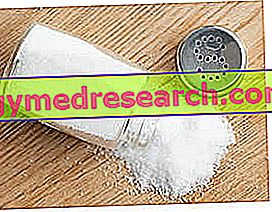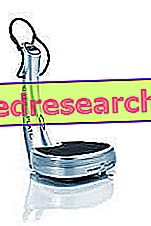Generality
Definition and description of royal jelly
Royal jelly is a natural product that acts as a food supplement and herbal remedy (even if of animal origin).

Royal jelly is a semi-fluid jelly with a milky color and a characteristic, typically acid-aromatic flavor.
What does royal jelly contain?
Royal jelly contains on average:
- 60-70% of water
- 12-15% protein
- 10-16% of sugar
- 3-6% fat
- 2-3% of vitamins
- salts and amino acids in varying amounts.
Its composition varies according to geography and climate.
How do you get royal jelly?
The method of collecting royal jelly is considered by many (including several beekeepers) to be a barbarous and unjust system: it takes place by entirely taking the real cells from the hive, thereby sacrificing the future queen bees. In this way it is possible to extract the nutritional complex, unfortunately modifying the life balance of the colony.
However, this is an ethically questionable procedure which, given the worrying general reduction in bees in the area, could also be ecologically discouraged and not entirely sustainable.
Indications
When to use royal jelly?
Royal jelly is perhaps one of the most widespread "general tonic" remedies in the world; it is also used to combat the effects of aging and to increase the efficiency of the immune system.
It is used as a supplement for internal use (orally), for natural therapy purposes (also in association with drugs), for the treatment of:
- Asthma
- Hay fever
- Liver disease
- Pancreatitis
- Insomnia
- Premenstrual Syndrome (PMS)
- Gastric ulcers
- Kidney diseases
- Bone fractures
- Symptoms of menopause
- Skin disorders
- Hypercholesterolemia
- General fatigue
- Aging
- Immune inefficiency.
Royal jelly also has a topical use; some advise to apply it directly:
- On the skin as a tonic
- On the scalp to stimulate hair regrowth.
Who should use royal jelly?
The use of royal jelly is indicated above all for the dietary integration of children and elderly people.
As for adults, they will be able to enjoy (more than others) the benefits of royal jelly: the debilitated, the people who work too much, the weakened, the neurasthenics and the super sportsmen (athletes).
Property and Effectiveness
Theoretical properties and effectiveness of royal jelly
It is believed that the continued use of royal jelly causes a pleasant sense of vitality; the perceptions of tiredness and listlessness linked to nutritional deficits (especially vitamins) are reduced, and this is why it is also recommended for athletes and sportsmen in general.
On children, royal jelly:
- Awakens the appetite
- Fights intestinal disorders
- Contrasts anemia
- Increases the body's overall tone.
The correct use of royal jelly could have a beneficial effect:
- On growth
- On the skin (makes it softer and more elastic)
- Against dandruff and hair loss
- On the duodenal ulcer (this affection in 60% of cases is due to pantothenic avitaminosis)
- On appetite (especially in children and convalescents)
- On diabetes, with a drop in the sugar rate in the blood up to 33%, recorded three hours after the administration of royal jelly
- On the neuro-psychism
- On anemia, especially senile
- Sull'astenia
- On excess cholesterol.
In some subjects, royal jelly causes an increase in genetic capacity.
What benefits has royal jelly shown during the studies?
Very little scientific information is available on the effects of royal jelly in humans. In animal models, it appears to have shown some positive reactions.
- Royal jelly has scientifically based effects for menopausal symptoms: some research shows that by taking a product based on royal jelly and flower pollen (Melbrosia) for 12 weeks, menopausal symptoms are reduced and the sensation of well-being in menopausal women. The same effects were found with another specific product based on royal jelly, evening primrose oil, damiana and ginseng.
- We do not possess sufficiently accurate information regarding the effects of royal jelly in the event of:
- Diabetic foot ulcer: topical application of royal jelly and panthenol for 6 months after cleansing and removal of dead tissues can improve healing of diabetic foot ulcers.
- Infertility: the application of a solution containing royal jelly, Egyptian honey and pollen in the vagina for 2 weeks can increase the pregnancy rate in couples with fertility problems due to a reduced spermatic movement (asthenospermia).
- High cholesterol: oral intake of royal jelly for 2-11 weeks could reduce cholesterol levels in people with hypercholesterolemia.
- Premenstrual Syndrome (PMS): oral intake of a specific product containing royal jelly, bee pollen extract and pistil extract for 2 menstrual cycles seems to decrease some symptoms of PMS such as: irritability, weight gain and swelling.
Further scientific tests are needed to confirm the efficacy of royal jelly for these uses and also for: asthma, liver disease, pancreatitis, insomnia, stomach ulcer, kidney disease, bone fractures, skin disorders, baldness, immune strengthening etc.
Doses and Mode of Use
How to use royal jelly?
The appropriate dose of royal jelly depends on several factors, such as the patient's age, health and several other conditions. At the moment there is not enough scientific information to establish a recommended dose.
The daily amount can be about 1 g / day for adults and adolescents, and ½ g / day for children; the dispenser generally attached to the package, held horizontally, collects about ½ gram.
Royal jelly should be consumed preferably in the morning on an empty stomach, a little before breakfast; it should be placed preferably under the tongue, so as to absorb it immediately through the mucous membranes overlying the salivary glands. The use of royal jelly combined with honey is excellent, dissolving the right amount in a teaspoon. Use is repeated 2 or 3 times a year for periods of at least 30 days at regular intervals.

storage
In its pure state, royal jelly can be kept in the fridge, where vegetables are the right temperature. Outside the refrigerator the royal jelly does not change but loses, after at least 8-10 days, a part of its nutritional qualities.
Side effects
Royal jelly could cause severe allergic reactions with symptoms of:
- Asthma
- Swelling of the throat
- Death (in case of severe anaphylactic shock).
More rarely, intake of royal jelly caused:
- Colon bleeding
- Stomach pain
- Bloody diarrhea.
Royal jelly is also considered safe when applied topically to the skin, in an appropriate manner. However, on the scalp it has been responsible for inflammation and allergic eruption.
Contraindications
When should royal jelly not be used?
Both oral and topical, the intake of royal jelly is to be avoided in the event of:
- Pregnancy and breastfeeding, due to lack of detailed data on the subject
- Allergy can cause severe reactions and even death
- Dermatitis, could aggravate the condition
- Low blood pressure could make it worse, compromising health.
Pharmacological Interactions
Which drugs or foods can modify the effect of royal jelly?
Royal jelly can interact moderately with warfarin, increasing its effects and increasing the likelihood of bruising or bleeding.
Precautions for Use
What do you need to know before taking royal jelly?
Before taking royal jelly, it is necessary to keep in mind that natural products are not considered necessarily safe and dosages can play a very important role.
Make sure you follow the directions on the labels and consult your pharmacist, doctor or other healthcare professional before using royal jelly.
Take a look at what is mentioned in the paragraphs on side effects, contraindications and drug interactions.
For children, it is advisable not to continue oral jelly over 6 months in duration.



